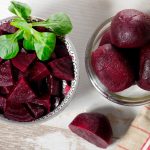“Unbeet-able” stamina: Recent research reveals the power of beet compounds
 (NaturalHealth365) For decades, knowledgeable nutritionists and holistic physicians have been touting the nutritional merits of beets – as well as their ability to promote heart health. These brilliant red root vegetables are rich in natural plant pigments and phytochemicals that have evidence-based abilities to sustain and enhance the health and function of body systems.
(NaturalHealth365) For decades, knowledgeable nutritionists and holistic physicians have been touting the nutritional merits of beets – as well as their ability to promote heart health. These brilliant red root vegetables are rich in natural plant pigments and phytochemicals that have evidence-based abilities to sustain and enhance the health and function of body systems.
Now, one particular group of compounds found in beets is turning out to be of particular interest to researchers. A new review suggests that the betalains in beets not only help battle oxidative stress and inflammation but may also reduce fatigue, boost energy, and improve athletic performance. (In other words, these humble veggies may qualify as a performance-enhancing food!) Read on to find out how betalains in beets and beet juice could help invigorate your workouts.
Could betalains naturally enhance your sports endurance?
It’s no surprise that researchers decided to evaluate betalains for their therapeutic potential. As the natural plant pigments responsible for beets’ vivid coloration, betalains have antioxidant and anti-inflammatory effects. They also increase levels of beneficial nitric oxide in the body, thereby helping to relax arteries and improve blood flow and circulation.
This, in turn, increases the availability of oxygen, leading to enhanced performance during exercise. The authors of the new review, which was published in Current Nutrition Reports, credited betalains with alleviating exercise-induced fatigue and improving sports performance. The new review builds on older studies, such as a small randomized controlled trial published in Medicine and Science in Sports and Exercise, showing that beet juice improved oxygen use and enhanced performance in a group of amateur cyclists exercising at simulated high altitudes.
Betalains combat exercise-induced muscle damage
The authors also cited studies showing that betalains could help ease exercise-induced muscle damage or EIMD. Professional and amateur athletes alike know that vigorous bouts of physical activity can damage skeletal muscles, resulting in symptoms of pain, stiffness, and loss of muscle strength that can last from two to 14 days. (Anyone who’s ever “overdone” it with an overly ambitious workout has likely experienced the aching and weakness that can follow.)
But beets and beet juice just might offer some relief. A new 2024 study published in Nutrients – involving 32 elite athletes who had just run a marathon – showed that beetroot extracts can significantly decrease blood levels of inflammatory markers such as C-reactive protein and malondialdehyde. At the same time, beet extracts appear to increase the activity of glutathione, a powerful antioxidant, and detoxicant produced in the body. The researchers concluded that beetroot supplementation “positively influences” recovery from muscle damage.
This echoes the findings of an earlier article published in Sports Medicine, in which researchers credited betalains from beets with reducing post-exercise muscle damage, inflammation, and fatigue, thereby speeding recovery after workouts. In other words, betalain-rich beets just might become your new pre- and post-workout buddies.
Beyond athletic stamina: The heart-healthy wonders of beets
The same properties of beets that enhance athletic stamina – such as increasing nitric oxide and promoting blood flow – can support heart health. And, it’s not just betalains in beets that benefit your “ticker.” Studies have suggested that healthy levels of potassium in beets can help lower blood pressure. In addition, a cup of cooked beets contains a respectable four grams of fiber, allowing them to support lower levels of homocysteine, a protein which – when present in excessive amounts – is implicated in heart disease.
Registered dietitian Sarah Thomsen Ferreira, R.D., points out that beets can improve arterial health and reduce LDL cholesterol. With their savory, earthy flavor and satisfying consistency, low-calorie beets may help create a sense of fullness that can reduce overeating and combat obesity. By the way, these dietary “good citizens” can also help stabilize blood sugar. Finally, beets are rich in folate, a B vitamin believed to help prevent strokes.
Beets are versatile, colorful, and tasty
You can use cooked, raw, or canned beets as colorful accents in salads or blend them with yogurt or hummus to craft a colorful dip. For a robust side dish, you can roast them sprinkled with a little olive oil and your favorite seasonings. Beets also excel as a base for smoothies. And beet juice, although it lacks the fiber of whole beets, is a great way to access the antioxidant power of beets. For maximum benefit, juice the beets yourself, as commercial brands may be high in added sugars. Finally, beet extracts are available in powdered form. Check with your holistic doctor before supplementing.
While ruby-red beets are the most common variety, purple, yellow, and gold beets are also available. All contain betalains. Red and purple beets deliver a type known as betacyanins, while yellow and golden beets contribute a different – but also beneficial – group known as betaxanthins. And don’t forget about the greens! Beet leaves can be cooked and enjoyed in much the same way as spinach and are packed with additional plant pigments, such as beta-carotene, lutein, and zeaxanthin.
Whether you’re a full-time workout buff, a casual exerciser, or a couch potato, beets have plenty to offer. Enjoy these crimson beauties – and reap the benefits!
Sources for this article include:
Springer.com
Clevelandclinic.org
Healthline.com
NIH.gov
NIH.gov
NIH.gov



